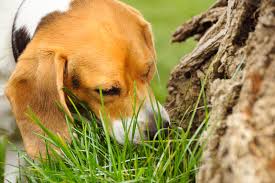
Why do dogs eat grass?
Eating non-food items like grass is technically known as pica and may be associated with a diet deficient in nutrients, vitamins, or minerals. But, dogs on well-balanced, commercial diets shouldn’t be nutritionally deficient, so why do they eat grass?
Is it a physical need?
One common assumption is that dogs eat grass to relieve upset stomachs. Some dogs consume grass with urgency, then vomit shortly afterwards. Here’s the chicken vs. egg dilemma: Does a dog eat grass to vomit and soothe an ailing stomach or does he develop a stomach ache and vomit because he ate grass? Since studies show that less than 25% of dogs vomit after eating grass, it’s unlikely that they turn to the green stuff as a form of se self-medication. In fact, only 10% of dogs show signs of illness prior to eating grass. The bottom line is that the majority of grass-eating dogs aren’t sick beforehand and don’t vomit afterwards.
However, there may be another digestive need filled by grazing. Dogs need roughage in their diets and grass is a good source of fiber. A lack of roughage affects the dog’s ability to digest food and pass stool, so grass may actually help their bodily functions run more smoothly.
Is it a psychological need?
A dog’s day focuses on his owners’ activities, watching them leave and anxiously awaiting their return. Although most dogs enjoy being outside, some get bored when alone and need to do something to pass the time. Nibbling grass that’s readily available helps fill the hours.
Dogs crave human interaction and may try to get their owners’ attention through inappropriate actions like eating grass if they feel neglected. In addition, anxious dogs eat grass as a comfort mechanism much like nervous people chew their finger nails. Whether dogs are bored, lonely, or anxious, it’s often noted that they grass eating increases as owner contact time decreases.
Is it instinct?
Your dog’s ancestors didn’t eat kibble packaged in sealed bags. Dogs in the wild balanced their diets by eating what they hunted – all of what they hunted – including meat, bones, internal organs, and stomach contents of their prey. Eating an entire animal provided a fairly balanced diet, especially when the prey’s stomach contained grass and plants that fulfilled the dog’s need for fiber.
Dogs are not true carnivores, but they aren’t exactly omnivores either; dogs in the wild consume anything that helps fulfill their basic dietary requirements. Examining stool samples shows that 11-47% of wolves eat grass. Modern dogs don’t have to hunt for their food, but that doesn’t mean they don’t retain the natural instinct to scavenge. Some dogs, even those that love their commercial dog food, will eat grass as a reflection of their heritage and the need to be scavengers.
For these dogs, eating grass is a behavior problem that really may not be a problem at all. You need not worry if the occasional grazing session doesn’t make the dog sick and consistent parasite prevention is provided. In fact, behavior modification may interfere with natural instincts and do more harm than good.
How do I stop my dog from eating grass?
Regardless of why your dog eats grass, it’s not the best snack for him. While the grass itself may not be harmful, the herbicides and pesticides sprayed on it can be toxic for your dog. Also, when plucking the grass from the ground, your dog may ingest intestinal parasites such as hookworms or roundworms that contaminate the grass in fecal residue from other dogs.
After reviewing the reasons why dogs eat grass and possible grazing solutions, one fact remains clear… the grass may be greener on the other side of the fence, but your dog still shouldn’t eat it!